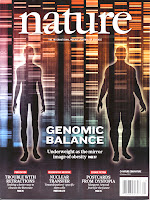We have a second publication out this year. This work is a major collaboration between chemists and biologists to find new chemical inhibitors of the enzyme Chk1. The chemistry was led by Dr Françoise Perron-Sierra and Dr Patrick Casara; they developed a new method to modify an amazing class of compounds known as "indolocarbazoles". By testing these new molecules we found several potent inhibitors of Chk1. These compounds add to our arsenal of tools to study how cancer cells enter mitosis with damaged DNA. The compounds also have potential as anti-cancer agents in solid tumours and leukaemias.
If you have questions or would like to know more, feel free to contact either myself (roy.golsteyn@uleth.ca) or Françoise (francoise.perron-sierra@fr.netgrs.com).
Friday, 4 November 2011
Thursday, 27 October 2011
Judging a scientific journal by its cover
This doesn't happen every day....
The pile of journals that I wanted to read was already too high and the 6 October 2011 issue of Nature had just arrived. So I placed Nature beside the pile, turned to grab my sandwich, and then reached to open this new issue. I realized, however, I had opened The Biochemist. So I closed The Biochemist and there it was, the same cover on Nature and on The Biochemist.

Saturday, 22 October 2011
Mitosis or apoptosis (life or death)
Our laboratory has invested much time and effort in developing an experimental model of how human cells can divide even when they have damaged DNA. The efforts are beginning to pay off. Recently we found that when cells enter mitosis with damaged chromosomes, they can inactivate apoptosis. Perhaps this should not be too surprising because mitosis should cause all the alarms to sound (loss of contact, changes in organelles, DNA everywhere). The rub is to know if cancer cells use this as another mechanism to survive. We are now examining the pathways that might provide survival. A new area for us, which was illuminated by our model and a pharmacological approach.
Friday, 16 September 2011
New Academic Year - New Laboratory Members
A new academic year begins with much promise and optimism. This year we are optimistic because we have two new graduate students and two new undergraduates joining the laboratory. New people mean new ideas and more energy to tackle the hard problem of how cancer cells divide. We are also optimistic because the our cell based model seems to hold the answers to what are the biochemical pathways that enable cancer cells to divide, when they should not. One enzyme, Checkpoint kinase 1, is clearly important but we also find that it is not acting alone. With help from the new recruits we are working to find the master regulator of checkpoint adaptation
Monday, 29 August 2011
Innovation in Research and Development
I am participating in the Technology Futures Summit meeting in Banff, AB. 28-30 August. This is meeting is different from research meetings, in that we are discussing innovation in science. How to cultivate it, nurture it and "deploy" it. The terminology and the goals are new, but very important in bringing the results of science to the people who pay for it. While keeping a valuable place for curiousity, hypothesis driven science, there is a greater demand to make discoveries useful. No formula exists yet, but common sense and hard work are key elements, as well as keeping the "consumer" at the forefront of new ideas. The speakers are excellent and all are "innovators". As one of them rightly said, "I'd rather be in the mountains thinking about science, than in the laboratory thinking about mountains."

Saturday, 16 July 2011
New paper in press
We have a new paper in press in "Life Sciences". This paper describes novel Chk1 inhibitors that are highly active in kinase assays and in cell-based assays. We now use Chk1 inhibitors to modify the timing of "checkpoint adaptation." The paper was a joint effort between the pharmaceutical company Servier Laboratories (France) and our own Mr Philip Kubara (his first paper).
How to see it? - go to the Pubmed website, type "golsteyn chk1" and the link will appear.
Any questions, please feel free to contact me.
How to see it? - go to the Pubmed website, type "golsteyn chk1" and the link will appear.
Any questions, please feel free to contact me.
Subscribe to:
Comments (Atom)

